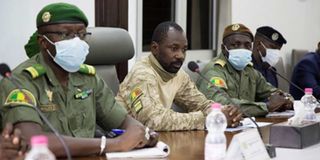Mali junta postpones first meeting over transfer of powers

President of the CNSP (National Committee for the Salvation of the People) Assimi Goita (C) prepares for a meeting between Malian military leaders and an ECOWAS delegation headed by former Nigerian president on August 22, 2020, in an aim to restore order after the military coup in Bamako. West African envoys held talks with Mali’s military junta on August 22 to try to push for a speedy return to civilian rule after a coup in the troubled nation. The delegation, headed by former Nigerian president Goodluck Jonathan, held talks for half an hour with soldiers who seized power on August 18, including new strongman colonel Assimi Goita, an AFP journalist said. The envoys from the regional ECOWAS bloc also hope to meet ousted president Ibrahim Boubacar Keita, who is being detained by the junta at a military camp outside Bamako. ANNIE RISEMBERG / AFP
What you need to know:
- The group has demanded that the military junta give it a role in the transition to civilian rule which the military has promised, though without a timetable.
Mali military rulers said on Saturday they were postponing their first meeting over the transfer of powers due to "organisational reasons" nearly two weeks after ousting the president in a coup.
The junta had invited civic groups, political organisations and former rebels to consultations on Saturday, but said in a statement that the meeting was postponed to a later date.
A protest coalition that had campaigned against former president Ibrahim Boubacar Keita, the June 5 Movement, had not been invited to participate in the meeting.
The group has demanded that the military junta give it a role in the transition to civilian rule which the military has promised, though without a timetable.
After an escalating series of mass protests, young army officers mutinied on August 18, seizing Keita and other leaders and declaring they now governed the country.
The coup shocked Mali's West African neighbours and ally France, heightening worries over instability in a country already struggling with an Islamist insurgency, ethnic violence and economic malaise.
Mali's influential imam Mahmoud Dicko, a key player in the mass opposition protests that led to Keita's ouster, said Friday that the new military rulers did not have "carte blanche".
His comments came as a new document published on the Malian government's Official Journal said the junta's head had been effectively invested with the powers of head of state.
West African leaders, meanwhile, on Friday demanded an immediate civilian transition and elections within 12 months as they considered sanctions.


